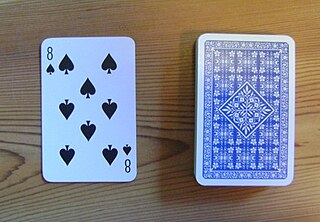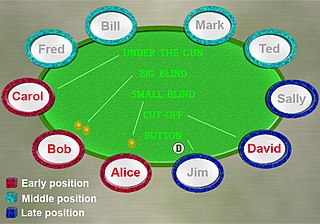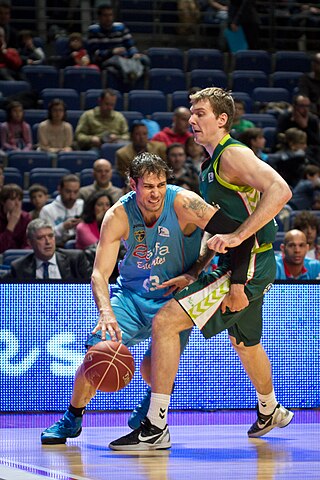Matchbox is a drinking game [1] of skill played around a table. It can be played by any number of people. The aim is to throw a matchbox such that it lands on its edge or end. It was invented by Liam Peoples of Essex . [2]
A "finger" is the amount of beer, in a straight or "conical" pint glass, covered by one finger on the outside of the glass.
Play proceeds around a circle. The player whose turn it is takes the matchbox and throws it. What happens next depends on how the box lands:
The matchbox may be labelled as a reminder of the numbers. Also an 'R' on one end and one edge may be used to signify that the direction of play should be reversed (if play it was moving anti-clockwise, passing to the right, the box now moves to the left).[ citation needed ]
International drinking rules apply. No pointing, left handed drinking only, pinkies must remain on the drinking vessel whilst drink is consumed.
As with many drinking games extra or different rules may be used by specific groups. Some are:

Mao is a card game of the shedding family. The aim is to get rid of all of the cards in hand without breaking certain unspoken rules which tend to vary by venue. The game is from a subset of the Stops family and is similar in structure to the card game Uno or Crazy Eights.

In the game of poker, the play largely centers on the act of betting, and as such, a protocol has been developed to speed up play, lessen confusion, and increase security while playing. Different games are played using different types of bets, and small variations in etiquette exist between cardrooms, but for the most part the following rules and protocol are observed by the majority of poker players.

Quarters is a drinking game which involves players bouncing an American quarter or similar-size coin off a table in an attempt to have the quarter land in a certain place, usually into a shot glass on that table. It is also played in South America, where it is called "monedita," Spanish for little coin.

Pay Day is a board game originally made by Parker Brothers in 1974. It was invented by Paul J. Gruen of West Newbury, Massachusetts, United States, one of the era's top board game designers, and his brother-in-law Charles C. Bailey. It was Gruen's most successful game, outselling Monopoly in its first production year. Pay Day is currently marketed by Winning Moves Games USA.

A penalty in ice hockey is a punishment for an infringement of the rules. Most penalties are enforced by sending the offending player to a penalty box for a set number of minutes. During the penalty the player may not participate in play. Penalties are called and enforced by the referee, or in some cases, the linesman. The offending team may not replace the player on the ice, leaving them short-handed as opposed to full strength. When the opposing team is said to be on a power play, they will have one more player on the ice than the short-handed team. The short-handed team is said to be "on the penalty kill" until the penalty expires and the penalized player returns to play. While standards vary somewhat between leagues, most leagues recognize several common varieties of penalties, as well as common infractions.
21, Bagram, or Twenty Plus One is a drinking game. The game progresses by counting up from 1 to 21, with the player who calls "21" suffering a drinking penalty before the next round starts. The loser may add 1 new rule to the game, and starts the new round.
In basketball, a technical foul is any infraction of the rules penalized as a foul which does not involve physical contact during the course of play between opposing players on the court, or is a foul by a non-player. The most common technical foul is for unsportsmanlike conduct. Technical fouls can be assessed against players, bench personnel, the entire team, or even the crowd. These fouls, and their penalties, are more serious than a personal foul, but not necessarily as serious as a flagrant foul.

Beer die, or snappa is a table-based drinking game in which opposing players sit or stand at opposite ends and throw a die over a certain height with the goal of either landing the die in their opponent's cup or having the die hit the table and bounce over the scoring area to the floor. The defending team attempts to catch the die one-handed after it hits the table, but before it touches a non-table surface. The game typically consists of two two-player teams with each of the four players having a designated cup on the table, but can also be played one-vs-one.
The game of Bartok, also known by a number of other names, such as Wartoke, Warthog, Bartog, Bentok, Last One Standing or Bong 98, is a card game popular in Australia where the winner of each round invents a new rule which must be obeyed for the remainder of the game. It belongs to the "shedding" or Eights family of card games, whereby each player tries to rid themselves of all of their cards. The game progresses through a series of rounds with a new rule being added in each round, thus making the game increasingly complex as it progresses. These newly introduced rules may modify any existing rules.

In basketball, a personal foul is a breach of the rules that concerns illegal personal contact with an opponent. It is the most common type of foul in basketball. A player fouls out on reaching a limit on personal fouls for the game and is disqualified from participation in the remainder of the game.

Bourré is a trick-taking gambling card game primarily played in the Acadiana region of Louisiana in the United States of America. It is also played in the Greek island of Psara, with the name Boureki. The game's closest relatives are probably Spades and Euchre; like many regional games, Bourré sports many variant rules for both play and betting considerations.

In sports, an ejection is the removal of a participant from a contest due to a violation of the sport's rules. The exact violations that lead to an ejection vary depending upon the sport, but common causes for ejection include unsportsmanlike conduct, violent acts against another participant that are beyond the sport's generally accepted standards for such acts, abuse against officials, violations of the sport's rules that the contest official deems to be egregious, or the use of an illegal substance to better a player's game. Most sports have provisions that allow players to be ejected, and many allow for the ejection of coaches, managers, or other non-playing personnel. In sports that use penalty cards, a red card is often used to signal dismissals. In some sports, another player is permitted to enter the game in place of the player who has been ejected, but in others the team is required to continue the game with a reduced number of players.
itbox is a networked gambling games terminal which is found in thousands of pubs, leisure centres and amusement arcades in the United Kingdom. Classified as a "skill with prize" (SWP) machine, each itbox terminal typically includes 25 different games. Each game costs 50p or £1 to play and lasts between 10 seconds and several minutes. From most of these games it is possible to win modest cash prizes. Although strictly the name 'itbox' refers only to Leisure Link-made terminals, the name is often casually applied as a genericized trademark to other SWP terminals such as Paragon SWP, Gamesnet, ind:e and Fatbox.
The following is a glossary of traditional English-language terms used in the three overarching cue sports disciplines: carom billiards referring to the various carom games played on a billiard table without pockets; pool, which denotes a host of games played on a table with six pockets; and snooker, played on a large pocket table, and which has a sport culture unto itself distinct from pool. There are also games such as English billiards that include aspects of multiple disciplines.

Snooker is a cue sport that is played on a baize-covered snooker table with pockets in each of the four corners and in the middle of each of the long side cushions. It is played using a cue and snooker balls: one white cue ball, 15 red balls worth one point each, and six balls of different colours: yellow, green (3), brown (4), blue (5), pink (6), black (7). A player wins a frame of snooker by scoring more points than the opponent(s), using the cue ball to pot the red and coloured object balls. A player wins a match when they have achieved the best-of score from a pre-determined number of frames. The number of frames is always odd so as to prevent a tie or a draw.

Baseball is a drinking game in which players shoot a ping-pong ball across a table with the intent of landing the ball in one of several cups of beer on the other end, doing so in a way combining beer pong and flip cup. The game typically consists of two teams of even numbers, one on each side of a table, and four cups set up on each side. The cups are lined up in a straight line representing the bases with the last cup at the edge of the table.

Tippen, also known as Dreiblatt, Dreikart, Drei Karten, Dreekort, Kleinpréférence or Labet, is an historical German 3-card, plain-trick game which was popular as a gambling game for three or more players. The Danish version of the game was known as Trekort and more elaborate Swedish variants include Knack and Köpknack. It appears to be related to the English game of Three-Card Loo. It was banned as a gambling game in some places.
Grosstarock is an old three-handed card game of the Tarock family played with a full 78-card Tarot pack. It was probably introduced into the southern German states around 1720 but spread rapidly into Austria and northwards as far as the Netherlands and Scandinavia. It only survives today in Denmark where it is called Tarok.

Grasobern, Grasoberl, Grasoberln, Graseberla, Grünobern, Lauboberl or Laubobern is a card game that was once commonly played in Old Bavaria, especially in the old counties of Bad Aibling and Rosenheim, and is still popular in eastern Bavaria, especially in Upper Palatinate. The game has relatively simple rules and thus a rather relaxing and leisurely character without the mental demands of Schafkopf or psychological stress of Watten, two other traditional Bavarian card games. The name is taken from the game's penalty card, the Ober of Leaves. The suit of Leaves is known in German variously as Laub, Gras ("grass") or Grün ("green").

Rödskägg ("redbeard") also called fem opp, is a Swedish card game for three to seven players in which penalties are incurred for failing to follow certain rituals as well as for failing to take a declared number of tricks. Some rules describe Fem Opp as a variant of Rödskägg. It is an advanced and tactically demanding game and, of games played in Sweden, only Bridge and Poker are considered more difficult.